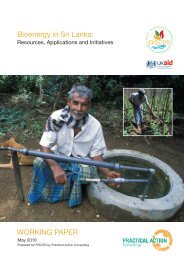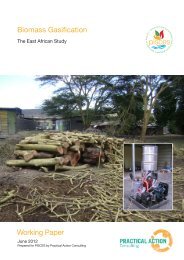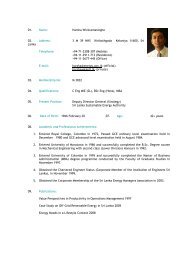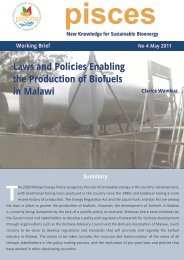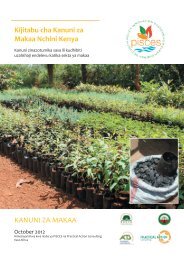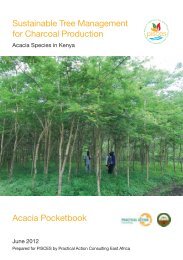Liquid Biofuels Strategies and Policies in selected African ... - Pisces
Liquid Biofuels Strategies and Policies in selected African ... - Pisces
Liquid Biofuels Strategies and Policies in selected African ... - Pisces
Create successful ePaper yourself
Turn your PDF publications into a flip-book with our unique Google optimized e-Paper software.
4. Review of biofuels development experiences<strong>Biofuels</strong> Development <strong>in</strong> Africa is be<strong>in</strong>g driven as much by external factors as byneeds with<strong>in</strong> the cont<strong>in</strong>ent. For example, the Kenyan <strong>Biofuels</strong> policy committee startedby look<strong>in</strong>g as deeply as possible <strong>in</strong>to other countries policies <strong>and</strong> drivers <strong>in</strong> order tounderst<strong>and</strong> their needs as much by comparison as by differentiation <strong>and</strong> elucidat<strong>in</strong>gwhat was different for Kenya. For this reason, this chapter looks first at some othercountries approaches without seek<strong>in</strong>g to be comprehensive. The purpose is to lookat some key drivers <strong>and</strong> responses. Ch<strong>in</strong>ese, Brazilian <strong>and</strong> Indian national <strong>and</strong> private<strong>in</strong>vestors <strong>and</strong> technology transfer schemes are also the ma<strong>in</strong> players <strong>in</strong> driv<strong>in</strong>g someof the larger scale <strong>in</strong>vestments <strong>in</strong> Africa. This section on some key non Africa countriesis then followed by a review of what could be established for 13 <strong>African</strong> Countries.Aga<strong>in</strong> it has not taken a st<strong>and</strong>ardised approach but seeks to illustrate some of thema<strong>in</strong> activities <strong>and</strong> lessons from each country as there is as yet no uniformity <strong>in</strong>activity, government response or approach throughout Africa.A recent report ‘Mapp<strong>in</strong>g Food <strong>and</strong> Bioenergy <strong>in</strong> Africa’ (FARA 2010) takes ast<strong>and</strong>ardised case study approach to 6 <strong>African</strong> countries with Ghana as an addedbenchmark. Institutional arrangements are mapped <strong>and</strong> generalised comments made.What is not brought out is the extent of effectiveness of <strong>and</strong> between the different<strong>in</strong>stitutions or bodies, <strong>and</strong> their ability to develop or <strong>in</strong>fluence the adoption of policy.This report provides useful general background data while not giv<strong>in</strong>g extended detailsof actual current activities on the ground.As identified <strong>in</strong> Chapter 2, areas that require frameworks <strong>and</strong> legislation <strong>in</strong> first <strong>and</strong>second generation biofuels <strong>in</strong>clude:• L<strong>and</strong> <strong>and</strong> water ownership, tenure <strong>and</strong> use rights.• L<strong>and</strong>, forest, water, biodiversity <strong>and</strong> wildlife management plans; environmentalconservation; protected species <strong>and</strong> habitats; conformity with protected areas <strong>and</strong>deforestation legislation.• Water resource allocation <strong>and</strong> abstraction laws.• Air, ground <strong>and</strong> water pollution, <strong>and</strong> compliance with pesticide <strong>and</strong> fertilizer use restrictions.• Greenhouse gas mitigation measures.• Seed <strong>and</strong> plant breed<strong>in</strong>g, seed sell<strong>in</strong>g <strong>and</strong> phyto-sanitary requirements.• Provisions on the use of genetically modified plants <strong>and</strong> organisms.• Environmental impact assessments.• Social impact assessments: zon<strong>in</strong>g, urban <strong>and</strong> rural plann<strong>in</strong>g considerations.• Public health <strong>and</strong> sanitation cover<strong>in</strong>g collection of <strong>and</strong> use of municipal waste aswell as waste management <strong>and</strong> disposal provisions.• Community participation: protection of <strong>in</strong>digenous peoples, local communities <strong>and</strong> women.• Labour rights: m<strong>in</strong>imum wage, job stability <strong>and</strong> the prohibition of child labour.• Worker health <strong>and</strong> safety, <strong>in</strong> agriculture <strong>and</strong> <strong>in</strong> production facilities.• Import <strong>and</strong> export laws.• Credit f<strong>in</strong>anc<strong>in</strong>g.• Tax laws <strong>and</strong> other <strong>in</strong>dustry fee regulations.• Process<strong>in</strong>g, sales, transportation <strong>and</strong> shipp<strong>in</strong>g laws.• Product market<strong>in</strong>g <strong>and</strong> certification regulations.Many of the above issues are covered <strong>in</strong> greater or lesser detail <strong>in</strong> exist<strong>in</strong>g differentlegislation <strong>and</strong> m<strong>in</strong>istries <strong>in</strong> many <strong>African</strong> countries, <strong>in</strong> particular those that coveragricultural development. As a result very few countries have seen the need orurgency to create a separate ‘<strong>Biofuels</strong> Policy’. This is despite the fact that, along with<strong>in</strong>creased Ch<strong>in</strong>ese <strong>and</strong> other new sources of <strong>in</strong>vestments <strong>and</strong> development projects,they are act<strong>in</strong>g as one of the largest agents of change <strong>in</strong> rural <strong>African</strong> l<strong>and</strong>scapes.Some National governments have created facilitative tax <strong>and</strong> <strong>in</strong>vestment regimes,designed strategies based on <strong>in</strong>tent or added sections on promot<strong>in</strong>g renewableenergy to exist<strong>in</strong>g Energy laws. Nevertheless the sudden growth of Foreign DirectInvestment <strong>in</strong> Africa is challeng<strong>in</strong>g the coherence <strong>and</strong> adequacy of exist<strong>in</strong>g legislationcover<strong>in</strong>g all these many areas impacted by <strong>in</strong>tense biofuels development. SometimesM<strong>in</strong>istries of Energies, who are often given the lead, are often concerned with howmany litres of biofuels can be generated to replace imported fuels, without view<strong>in</strong>g therelated social <strong>and</strong>/or environmental impacts of produc<strong>in</strong>g such quantities of biofuelsas be<strong>in</strong>g part of their m<strong>and</strong>ate or concern. As is becom<strong>in</strong>g clear, success <strong>in</strong> meet<strong>in</strong>gall the potential national benefits biofuels can offer, while avoid<strong>in</strong>g the many pitfalls,requires a well thought through strategy bridg<strong>in</strong>g a wide range of <strong>in</strong>tegrated <strong>and</strong><strong>in</strong>ter-l<strong>in</strong>ked issues. It could be fair to say that Africa has never faced a challenge oropportunity quite like this before.These attitudes <strong>and</strong> approaches mean that plann<strong>in</strong>g to mitigate risks through a wellplanned<strong>in</strong>tegrated approach is often miss<strong>in</strong>g, <strong>and</strong> problems, even if identified <strong>and</strong>addressed at all, are often done so only afterwards. Forests are be<strong>in</strong>g cut down,farmers <strong>and</strong> families are be<strong>in</strong>g forced to move, prime agricultural l<strong>and</strong> is be<strong>in</strong>gacquired, <strong>in</strong>tensive use of fertilizers is tak<strong>in</strong>g place <strong>and</strong> water resources are be<strong>in</strong>gdiverted. Currently there tends to be two polarised views; those of governmentswho seldom see the problems; <strong>and</strong> those of NGO’s who raise all the concerns. Whatis missed <strong>in</strong> this polarisation is <strong>in</strong>-depth analysis <strong>and</strong> political fram<strong>in</strong>g of the wholepicture. While often focus<strong>in</strong>g on the negative aspects of the <strong>in</strong>troduction of large-scalebiofuels <strong>in</strong>to Africa, <strong>in</strong>ternational organisations <strong>and</strong> NGO’s seldom analyse what willhappen to Africa’s forests, l<strong>and</strong>scape <strong>and</strong> wildlife if biofuels <strong>and</strong> modern agricultureare not <strong>in</strong>troduced.It might be argued that poverty, <strong>in</strong>secure l<strong>and</strong> tenure <strong>and</strong> almost total reliance onwood fuel biomass for cook<strong>in</strong>g <strong>and</strong> rural charcoal <strong>in</strong>comes <strong>and</strong> <strong>in</strong> some cases, bushmeat for prote<strong>in</strong> are also the some of the environmentally destructive forces <strong>in</strong> Africa,both <strong>in</strong> environmental destruction as well as the toll on rural health.To get the balance right, dedicated biofuels <strong>and</strong> emerg<strong>in</strong>g crops policies, aligned withagricultural <strong>and</strong> environmental legislation are required. However, it is not always easyfor Energy M<strong>in</strong>istries to develop the best strategies on their own from the start. In anumber of cases <strong>in</strong> Africa, such as <strong>in</strong> Ghana, Kenya <strong>and</strong> South Africa, draft policies<strong>and</strong> strategies respectively have been created but have not yet been passed <strong>in</strong>to law.Policy makers quite rightly argue that there are too many unknowns, such as eventualjatropha yields, chang<strong>in</strong>g EU certification rules, unpredictable ethanol markets<strong>and</strong> unknown tax <strong>and</strong> excise implications, to base such policies on evidence <strong>and</strong>experience. Nevertheless there is a case for develop<strong>in</strong>g <strong>and</strong> then test<strong>in</strong>g draft policiesbased on what is known while further research is carried out to ensure that the most<strong>in</strong>clusive <strong>and</strong> effective decisions are made.As such, the implementation of biofuels programmes <strong>in</strong> one <strong>African</strong> country can benefitfrom experiences <strong>and</strong> current strategies adopted by other countries. This section verybriefly presents some of the biofuels activities <strong>and</strong> programmes <strong>in</strong> a number of <strong>selected</strong>countries. The aim is to give a snapshot of a fast evolv<strong>in</strong>g <strong>in</strong>dustry rather thana scholarly or comparative review of <strong>in</strong>dividual country legislative frameworks.26 <strong>Liquid</strong> <strong>Biofuels</strong> <strong>Strategies</strong> <strong>and</strong> <strong>Policies</strong> <strong>in</strong> <strong>selected</strong> <strong>African</strong> Countries <strong>Liquid</strong> <strong>Biofuels</strong> <strong>Strategies</strong> <strong>and</strong> <strong>Policies</strong> <strong>in</strong> <strong>selected</strong> <strong>African</strong> Countries 27



